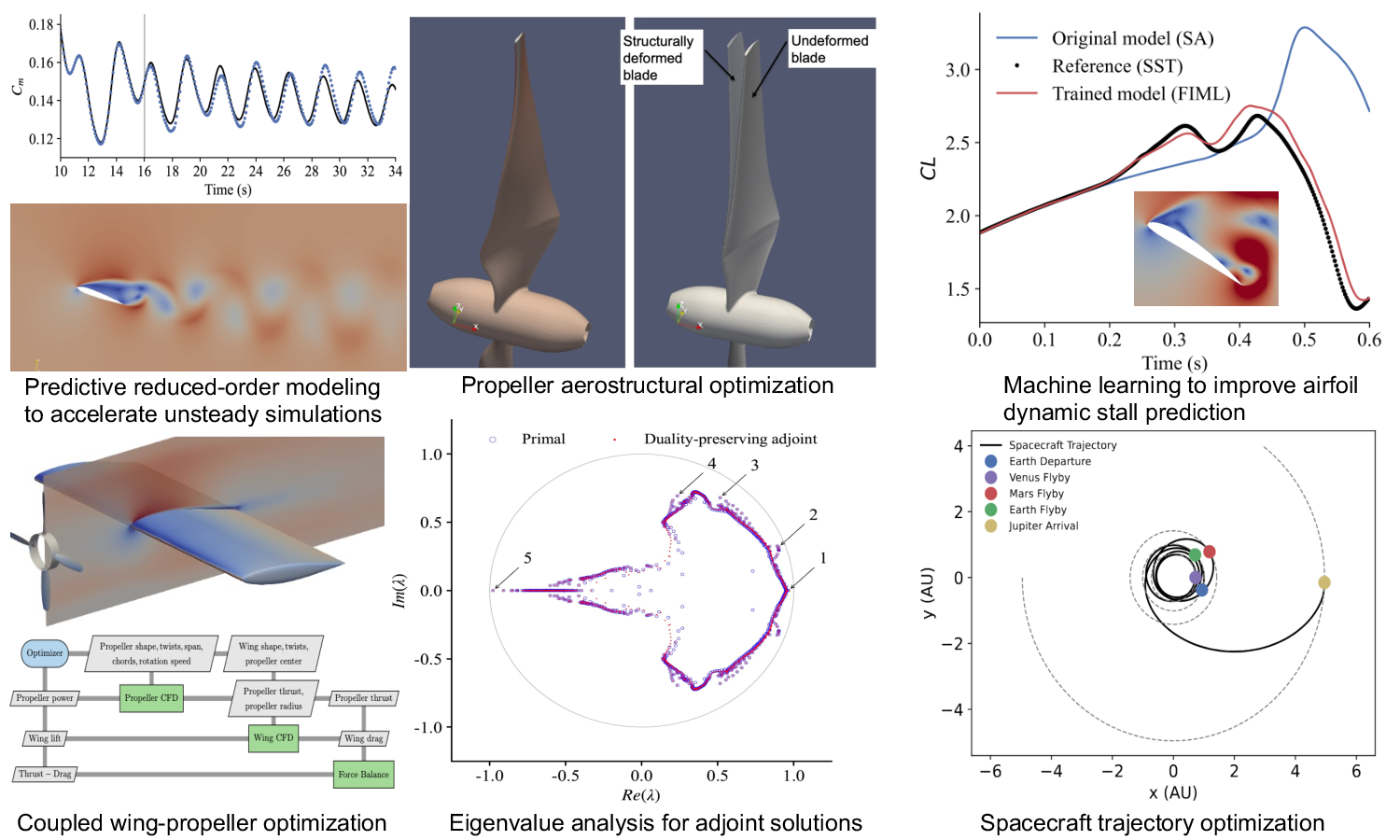Collaborative Research: Enabling Large-scale Multidisciplinary Design Optimization with Unsteady Simulations: A Hybrid Pseudo-spectral Approach (NSF-CMMI-EDSE. 9/2022 to 8/2026)
This project is funded by the Engineering Design and System Engineering (EDSE) program within the CMMI Division of NSF. [Project website]
This project will develop a breakthrough multidisciplinary design optimization (MDO) framework that uses unsteady multiphysics computer simulations to optimize system performance automatically. The research is motivated by the lack of effective numerical algorithms to shorten the design period for large-scale engineered systems with unsteady processes, such as spacecraft, aircraft, and wind turbines. This issue is further exacerbated by ever-increasing expectations for system performance and safety. The automated MDO framework will significantly reduce the design cycle time for transformative systems that are poised to improve the nation?s economic prosperity and change how people live and connect, such as urban air taxis and systems supporting space travel. Furthermore, this project will advance the knowledge of complex mechanisms and interactions in large-scale engineered systems, which would otherwise be hard to obtain solely by human intuition. This project will also conduct educational and outreach activities for underrepresented minority and K-12 students to encourage STEM engagement, promote diversity and inclusion, and stimulate students’ interest in engineering design and optimization.
The research objective of this project is to enable the gradient-based multidisciplinary design optimization (MDO) of large-scale engineered systems governed by unsteady processes. The project will develop a new hybrid pseudo-spectral (HPS) adjoint algorithm to compute unsteady gradients for a broad range of disciplines efficiently. The originality of the HPS algorithm is that it effectively combines the robustness of time-accurate analysis and the speed of pseudo-spectral adjoint to enable efficient computation of high-dimensional unsteady gradients. The project will investigate the fundamental characteristics of the HPS algorithm and develop a modular architecture to couple any number of disciplines for large-scale unsteady MDO. It will demonstrate the framework by conducting urban air mobility electric aircraft and offshore wind turbine MDO that considers the unsteady coupling between fluid mechanics, structures, heat transfer, and dynamics. With further development, the framework can be extended to more disciplines, such as control and multiphase flow. The unsteady MDO framework will be open to the public to promote collaborations in the engineering design community. The HPS algorithm is general and expected to benefit many other fundamental research areas beyond MDO, including surrogate modeling, error and uncertainty analyses, and machine learning. Moreover, this project is anticipated to create a catalytic effect in the engineering design industry to transform the traditional, human-supervised design process into a more automated one.

Publications:
-
Fang, Lean and He, Ping “A Duality-Preserving Adjoint Method for Segregated NavierStokes Solvers” Journal of Computational Physics , 2024 https://doi.org/10.1016/j.jcp.2024.112860
-
Fang, Lean and He, Ping “Field inversion machine learning augmented turbulence modeling for time-accurate unsteady flow” Physics of Fluids , v.36 , 2024 https://doi.org/10.1063/5.0207704
-
Harris, Gage W. and He, Ping and Abdelkhalik, Ossama O. “Control Co-Design Optimization of Spacecraft Trajectory and System for Interplanetary Missions” Journal of Spacecraft and Rockets , 2024 https://doi.org/10.2514/1.A35680
-
Li, Zilong and He, Ping “Accelerating unsteady aerodynamic simulations using predictive reduced-order modeling” Aerospace Science and Technology , v.139 , 2023 https://doi.org/10.1016/j.ast.2023.108412
-
Li, Zilong and Fang, Lean and Sharma, Anupam and He, Ping “Field Inversion Machine Learning for Accurate Predictions of Time-Resolved Unsteady Flows Over Airfoils” , 2025 https://doi.org/10.2514/6.2025-2049
-
Fang, Lean and He, Ping “Implicit Runge-Kutta Schemes for Segregated Solutions of Unsteady Flow and Adjoint Equations” , 2025 https://doi.org/10.2514/6.2025-0577
-
Zoppelt, Seth A. and Koyuncuoglu, Heyecan and He, Ping “High-fidelity Aerostructural Optimization Benchmark for Aircraft Propellers in Hover” AIAA SciTech Forum , 2024 https://doi.org/10.2514/6.2024-2773
-
Fang, Lean and He, Ping “A Segregated Time-Accurate Adjoint Method for Field Inversion of Unsteady Flow” AIAA SciTech Forum , 2024 https://doi.org/10.2514/6.2024-0158
-
Harris, Gage W. and He, Ping “Low-Thrust Spacecraft Trajectory Optimization with Gravity-Assist Maneuver using Dymos” AIAA SciTech Forum , 2024 https://doi.org/10.2514/6.2024-0633
-
He, Ping and Koyuncuoglu, Heyecan and Hu, Helen and Dhulipalla, Anvesh and Hu, Haiyang and Hu, Hui “High-fidelity aerodynamic and aerostructural optimization of UAV propellers using the adjoint method” AIAA SciTech Forum , 2023 https://doi.org/10.2514/6.2023-0531
-
Koyuncuoglu, Heyecan and He, Ping “CFD Based Multi-Component Aerodynamic Optimization for Wing Propeller Coupling” AIAA SciTech Forum , 2023 https://doi.org/10.2514/6.2023-1844